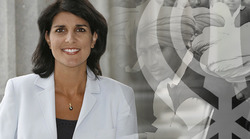Nikki Haley: Is she Sikh enough?
 By Viji Sundaram, New America Media
By Viji Sundaram, New America MediaNikki Haley won the Republican nomination for governor of the state of South Carolina Tuesday. She now has to start thinking about the general elections in November. A dyed-in-the-wool conservative, Haley stands a very good chance of beating back the challenge from Democratic state Sen. Vincent Sheheen in the right-leaning Southern state, political pundits say. If she does, Haley, neé Nimrata Randhawa, will be the first Indian American woman -- in fact, the first woman ever -- to become the governor of her native South Carolina.
After almost five decades of struggling to establish themselves in their adopted land, Indians in America, currently numbering close to two million -- which is less than 1 percent of the total population -- are now no longer satisfied with limiting their political participation to holding fundraisers, photo ops or working campaigns. They are running for public office, and at least eight of them nationwide are hoping to snag fairly high-powered posts this year.
Desis already have one of their own in another governor's mansion. Bobby Jindal, whose parents migrated to the United States when he was, as he more than once described it, a "pre-existing condition" in his mother's womb, rapidly rose from the head of the Louisiana state Department of Health and Hospitals to president of the University of Louisiana before he was 27. He was elected to the U.S. Congress at age 33, becoming only the second Indian to serve as a congressman. (Dalip Singh Saund was the first Indian American to be elected to Congress in 1956. He served three terms.) In 2008, at the age of 36, Jindal became Louisiana's youngest governor.
In the capital city of Columbia where the 37-year-old Haley's parents live, the Indian diaspora has been bristling with pride for months now that one of their own is running for the highest office in the state. The population of Indian Americans in South Carolina is only around 10,000.
Many seem to have unquestioningly accepted Haley's conversion to Christianity nearly 14 years ago to marry her Methodist husband.
"That was her decision to convert, and who are we to question it?" said Parminder Kaur Dhillon, a North Carolina resident who is a trustee of the Sikh temple there. And, Dhillon noted, "It's good she converted because it makes it easier on the children to be raised in one faith."
Inderjit Singh, a professor of pediatrics at the Medical University of South Carolina and a longtime friend of Haley's parents, mom Raj Randhawa, and dad Ajit Singh Randhawa, said the Randhawas raised their four children in a very secular environment. Singh said her parents are just as comfortable attending interfaith gatherings as they are attending services at South Carolina's only Sikh temple in Columbia. Singh serves on the temple board.
Singh said he has heard no criticism from any of his Sikh acquaintances in Columbia, where about 100 Indian families reside, about Haley's conversion.
"Sikhs themselves converted from Hinduism and Islam. So why would we criticize?" But despite her conversion, Singh noted, "Nikki never distanced herself from the Sikh faith."
Jindal converted to Christianity also, when he was a sophomore at Brown University. He was baptized a Catholic, a rite his Hindu parents did not attend.
It is clear that some in the Indian diaspora disapprove of how "public and unflinching" Jindal and Haley have been about their embrace of Christianity. In a press release put out by the Hindu American Foundation today, its founder Aseem Shukla wondered what was "so miserably wrong and unelectable in being a Hindu, Sikh, Buddhist or Jain?"
"Religious conversion," Shukla wrote, "should be a personal sojourn, but Jindal's and Haley's capitulation to an evangelical insistence on public religiosity and rejection of their ancestral faiths are galling to many."
Yet Haley's campaign platform resonated with conservatives in South Carolina. She supports limited government, opposes Obama's stimulus package and backs Arizona's hard line on illegal immigration. Former vice presidential candidate Sarah Palin and the Chai Tea Party have endorsed her.
Haley spent the weeks leading to the June 8 primary denying a smear campaign by a blogger and another by a lobbyist that they had physical relations with her. Soon after that, she had to face disparaging remarks by state Senator Jake Knotts, a supporter of her opponent. The senator called her a "raghead" and accused her of being in the forefront of a power grab by the Sikh community in South Carolina.
"Democrats for Nikki," a mostly Indian American group in Columbia, has supported Haley since she tossed her hat into the ring, Singh said. Like him, most of them are planning to vote for Haley in November.
"This is the first time in my voting years I will be voting for a Republican," Singh noted. "I'm doing it because we believe she can change the political landscape."
